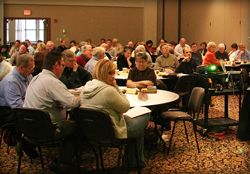 Discovering Your Spouse’s Love Language
Discovering Your Spouse’s Love Language
One of the simplest ways to discover your spouse’s love language is to listen to his or her complaints.
by Gary Chapman
If the key to meeting your spouse’s need for emotional love is learning to speak his or her love language, how can you discover what that love language is? It’s simple. Listen to your spouse’s complaints. Here are five common complaints and the love language that each reveals:
“You mean you didn’t bring me anything? Did you even miss me while you were gone?” (receiving gifts)
“We never spend any time with each other anymore. We’re like two ships passing in the dark.” (quality time)
“I don’t think you would ever touch me if I didn’t initiate it.” (physical touch)
“I can’t do anything right around here. All you ever do is criticize. I can never please you.” (words of affirmation)
“If you loved me, you would do something around here. You never lift a finger to help.” (acts of service)
Typically, when our spouse complains, we get irritated. But he or she is actually giving us valuable information. Complaints often reveal the key to our spouse’s inner longing for emotional love. If we learn our mate’s primary love language – and speak it – we will have a happier spouse and a better marriage.
But what if your spouse’s primary love language is something that isn’t easy for you to do? What if you’re not a touchy-feely person but your spouse’s primary love language is physical touch? The answer is simple, though not necessarily easy: You learn to speak the language of physical touch. You learn to speak a new love language by trying.
At first it might be very difficult, but the second time will be easier, and the third time even easier. Eventually, you can become proficient in speaking your mate’s love language; and if he or she reciprocates by speaking your language, the two of you will keep emotional love alive in your marriage.
My files are filled with letters from people who tell me that learning their spouse’s primary love language revolutionized their marriage. For example, Rick, a 33-year-old truck driver who has been married for 12 years, wrote, “After I discovered [my wife’s] love language, it helped me to understand why she had been saying that I didn’t love her. I knew I loved her, and I told her all the time. The problem was that her love language is acts of service, and I never did anything to help her around the house. I guess I followed my dad’s example – but then Mom and Dad never had a very good marriage, either. Now I try to do things for Brenda when I’m home. It has made a great difference in our marriage.”
Rick’s wife, Brenda, wrote, “We were having serious problems and were talking about separating. … Then Rick and I started talking about our relationship. I learned that his love language is words of affirmation. Here I had been criticizing him because I didn’t feel loved by him, but all along I was only making him feel worse and didn’t know it. Now he speaks my language and I speak his. We went from a very wintry season to a warm spring or summer season.” Understanding your spouse’s primary love language – and learning to speak it – can make a world of difference in your marriage.
What if your spouse is unwilling to read a book about marriage or discuss your marriage? With marriages in the fall and winter seasons, this is often the case. One spouse becomes concerned enough about the marriage to read a book, attend a seminar or go for counseling, while the other spouse is unwilling to do anything.
This is when unconditional love becomes exceedingly important. It is easy to love your spouse when your spouse is loving you. It is easy to say kind words to your spouse when he or she is treating you kindly. But even if your spouse is unwilling to try or to reciprocate, unconditional love means that you will choose to love your spouse in his or her primary love language.
Although unconditional love is difficult, it is the kind of love that God has for us. Romans 5:8 says that God loved us “while we were still sinners” and sent Christ to die for us. Scripture also says that we love God “because he first loved us” (1 John 4:19). Therefore, when you choose to love your spouse unconditionally, you are following God’s example. And if you ask God, He will give you the ability to do it.
In Romans 5:5 the apostle Paul says, “God has poured out his love into our hearts by the Holy Spirit.” Likewise, when you pour out your love by speaking your spouse’s love language, you are doing the most emotionally powerful thing you can do. Your spouse desperately needs emotional love from you. As your spouse’s love tank begins to fill, there is a good chance that he or she will begin to reciprocate.
A full love tank creates a positive atmosphere in which you and your spouse can talk about your differences more easily and negotiate solutions to your conflicts. I have seen many hard, cold men and women melt when they begin to receive love in their love language. Love is the most powerful weapon in the world for good. It can thaw the coldest of winters and bring the blossoms of spring to your marriage.
Adapted from The Four Season of Marriage, published by Tyndale House Publishers. Copyright © 2005 by Gary Chapman. All rights reserved. Used by permission.
